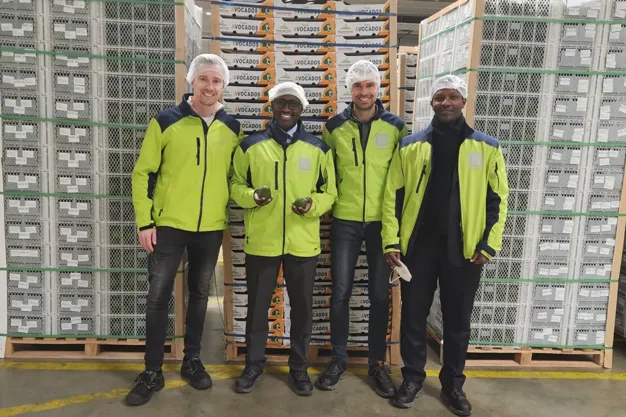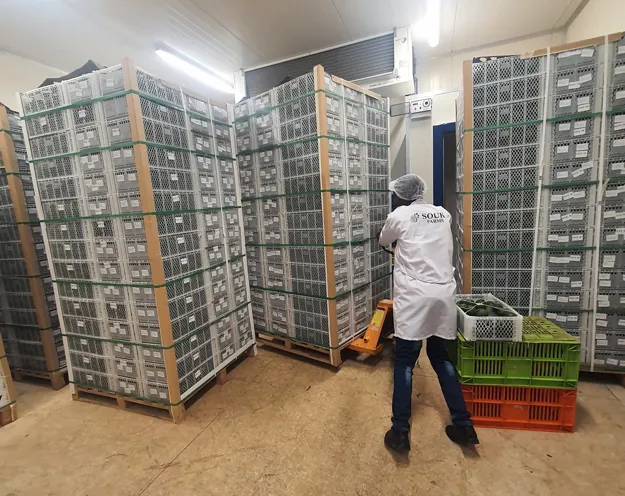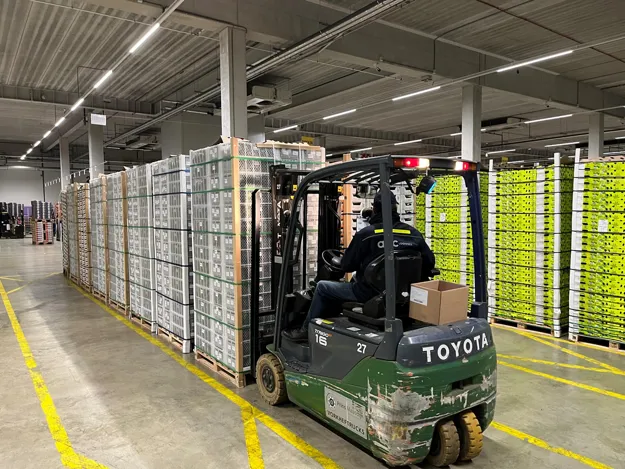On Monday, November 27, the first reefer container of Rwandan avocados arrived at Avor in the Netherlands. Rwanda's ambassador to the Netherlands, Olivier Jean Patrick Nduhungirehe, his colleague Jean Hugues Mukama, Nico Spruijt of Avor, and Tom Bouwman of Flying Swans were there to welcome it.
"The fruit's quality is good, and the avocados are suitable for ripening for our customers," begins Nico Spruijt, Avor's Commercial Manager, who imported the avocados. This successful arrival is considered a breakthrough in Rwanda's horticultural sector development, giving it access to the European market.

Rwandan/Dutch collaboration
This shipment results from a collaboration between various Rwandan and Dutch parties. Local IDH experts - at the behest of the Dutch Embassy in Rwanda's HortInvest program - helped SOUK Farms, the exporter in Rwanda, sort, pack, and load the avocados.
Maersk handled logistics from the packing facility to the port of Rotterdam, and Flying Swans, a Dutch cross-industry consortium, supervised and facilitated the entire process. "Flying Swans always works with local partners and authorities and Dutch companies for its projects," explains Marcel Biemond, Flying Swans' Director.
Northern Corridor
The container was trucked from Kigali in Rwanda through Uganda to the port of Mombasa in Kenya. This route is called the Northern Corridor, and Kenya wants to use it to serve the inland countries from the port of Mombasa. Flying Swans is working on several developments for refrigerated logistics along this corridor.
Those include transporting reefer containers by train to the port and developing consolidation centers for fruits, vegetables, and flowers at key logistics hubs. "These types of more efficient hinterland developments are vital to make export fruit and vegetable chains to the Netherlands more competitive," Nico believes.
Avocados from Rwanda
For several years, Rwanda has been exporting rapidly expanding volumes of avocados overseas, especially to the Middle East. That has been only by air freight, except for one test container shipped to Dubai last November. That container and this shipment to the Netherlands show that exporting avocados by sea from Rwanda is feasible. "We consider that the only sustainable way," says Marcel Biemond of Flying Swans. "It's cheaper and emits far less CO2 than air freight."

Flying Swans
“We believe in African countries, especially Rwanda's, potential to export fruit and vegetables. However, that must have well-organized cold storage logistics," Marcel continues. That, then, is what the Flying Swans program, funded by Invest International, wants to achieve.
"Invest International proactively drives sustainable, inclusive international trade's development. This is a wonderful example of a win-win situation. Logistics-related CO2 emissions are reduced, and, at the same time, opportunities and economic value are created," adds Femke Bos, Director of Business Development, Strategy & IESG at Invest International.
Opportunities for the Netherlands
“This project proves that Dutch fruit and vegetable companies are pioneers that keep finding new opportunities. They're entrepreneurial and contribute to infrastructure development worldwide," states Janine Luten, GroentenFruitHuis's Director. More avocados from Rwanda are expected to arrive in Europe in the coming years. As for other products, it is now increasingly possible to switch from air to sea freight.
That is why the Port of Rotterdam supports Flying Swans' activities. "We're Europe's primary fruit and vegetable import port. As such, we happily make our services and infrastructure available to boost these initiatives and make the logistics process more sustainable," concludes Danny Levenswaard, Breakbulk Director at the Port of Rotterdam Authority.

For more information:
Tom Bouwman
Mob: +31 (0) 645 020 938
Email: [email protected]
Website: www.flyingswans.org
